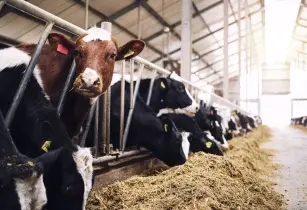The Government of Zimbabwe through the Department of Veterinary Services (DVS), with support from Food and Agriculture Organization (FAO) and the European Union (EU) has launched a ten year integrated national ticks and tick-borne disease control strategy in Harare
Tick-borne diseases (TBDs) are responsible for huge economic losses in cattle assets and farm savings in Zimbabwe. They account for more than 60% of cattle deaths in the country.
The launch is part of multiple FAO and EU interventions that complement government efforts to correctly position the livestock sector for making meaningful contribution to the National Development Strategy 1 and achievement of the country’s vision 2030.
The strategy we are launching is specifically to address the scourge of tick-borne diseases, the most problematic of which is theileriosis commonly known as January Disease. Tick-borne diseases have always been a huge problem in Zimbabwe from time immemorial. The EU funded ZAGP- SAFE project has come at an opportune time to buttress government efforts in the fight against tick-borne diseases that have seen a number of vulnerable households lose their valuable assets and source of livelihood,” said John Basera, permanent secretary in the Ministry of Lands, Agriculture, Fisheries, Water and Rural Development.
“The strategy emphasises the need for evidence-based decision-making based on localised solutions, with robust engagement of community and public and private players along the ruminant livestock value chain. The use of the vaccines will help to protect cattle and reduce mortalities and usage of curative antibiotics. All this is in line with the overall objective of the SAFE project of transforming Zimbabwe’s animal health, and food safety systems for improved livestock productivity, food safety and consumer safety to enhance market access,” said Talla in his remarks read on his behalf by Berhanu Bedane, FAO animal production and health officer.
The SAFE project is being implemented under the EU and FAO funded Transforming Zimbabwe's Animal Health and Food Safety Systems for the Future (SAFE) project that started in March 2019. The SAFE project is part of an EU funded Zimbabwe Agricultural Growth Programme (ZAGP), a response to tackle challenges within the country’s livestock sector through financial support from the EU amounting to US$43mn. During the launch, the SAFE project officially handed over the commissioning of refurbished tick-borne disease vaccine production unit at the central veterinary laboratory at the DVS headquarters in Harare.
“The strategy was developed through combined wide consultations in-country and best practices in the region and beyond and as such it is a comprehensive product to be implemented across the farming sectors,” added Talla.
According to a statement from the EU Delegation, “Enhancing control of tick-borne diseases is an essential public service for the preservation of production systems of many cattle and goat keepers affecting their future capital. The EU’s support to the SAFE project, as well as renovation of the TBD vaccine production facility is helping to ensure the implementation of animal disease control strategies that are key for ensuring not only public health, but animal health, welfare and productivity.”
The Permanent Secretary acknowledged that the strategy will add to the list of blue print documents to guide activities for the achievement of vision 2030. He outlined the 16 touch points for successful strategy implementation and emphasised the need for all value chain players and development partners to play their roles in the strategy implementation. He also expressed his expectation to see a reversal of the current trend in tick-borne disease occurrence in the country and consequently improvement of livelihoods.





